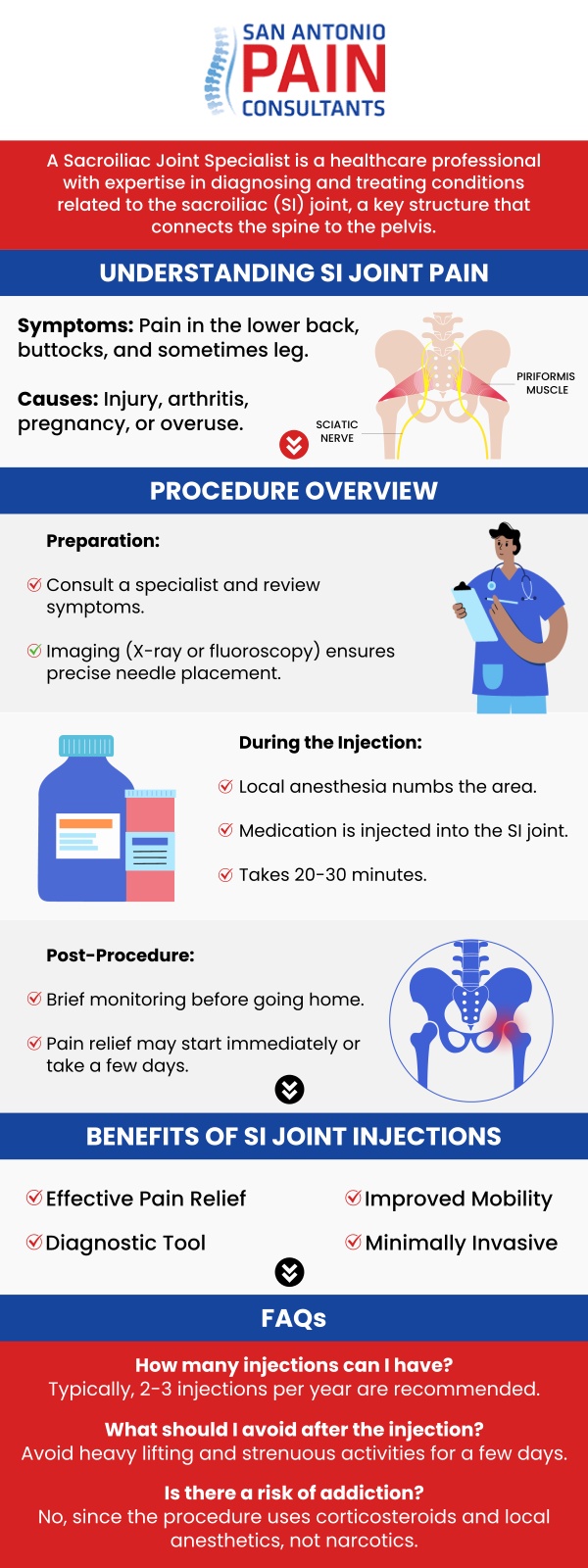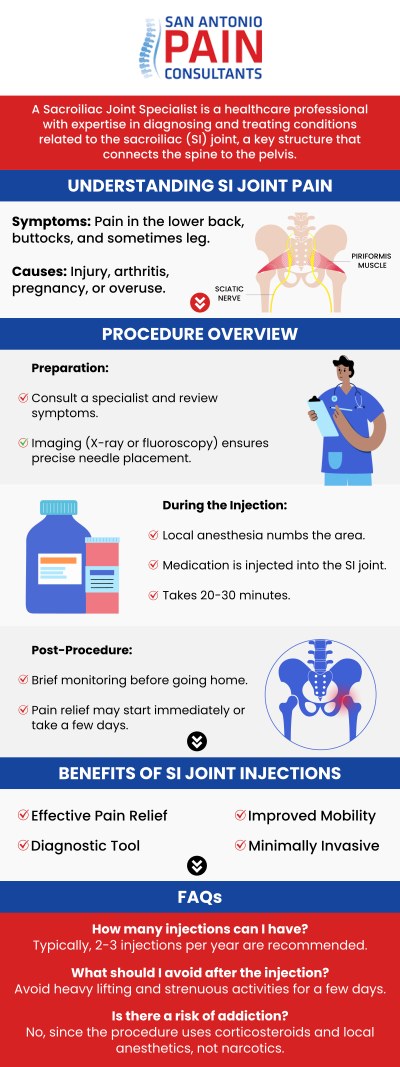Sacroiliitis: Symptoms and Treatment Q&A
Dr. Darius Zagunis, M.D., at San Antonio Pain Consultants, addresses the common symptoms of sacroiliitis, which include lower back pain, stiffness in the hips, and discomfort when sitting or standing for long periods. The treatment approach at San Antonio Pain Consultants focuses on reducing inflammation, alleviating pain, and restoring mobility through a combination of physical therapy, medications, and advanced pain management techniques. For more information, contact us or schedule an appointment online. We are located at 3903 Wiseman Blvd, Ste 117, San Antonio, TX 78251.




Table of Contents:
What are the symptoms of sacroiliitis?
What are the complications of sacroiliitis?
What can be mistaken for sacroiliitis?
What doctor should I see for sacroiliitis?
What is the best treatment for sacroiliitis?
Precision Diagnosis and Conservative Care: Dr. Darius Zagunis, M.D.,’s Initial Strategy
At San Antonio Pain Consultants, we understand the challenges that come with conditions like sacroiliitis. Sacroiliitis refers to inflammation affecting one or both of the sacroiliac joints, located where your lower spine connects to your pelvis. If you’re experiencing pain in your lower back, buttocks, hips, or thighs, our pain management specialists can help determine if sacroiliitis might be the cause.
Patients often report stiffness and limited mobility, especially after prolonged sitting or standing. Activities such as climbing stairs, running, or simply standing for extended periods can exacerbate the pain and discomfort. We recognize how these symptoms interfere significantly with daily life, making even basic tasks challenging. Additionally, you may notice the pain is particularly intense in the mornings or after a long period of inactivity, gradually improving with gentle movement.
In some cases, sacroiliitis symptoms can radiate down your legs, closely resembling sciatica, and can disrupt your sleep patterns due to discomfort when lying down or changing positions in bed. Our team is committed to providing comprehensive evaluations, personalized treatment plans, and compassionate care to help you manage sacroiliitis effectively and restore your quality of life.
At San Antonio Pain Consultants, we recognize the significant impact sacroiliitis can have on your daily life and overall well-being. This inflammatory condition affects one or both sacroiliac joints, connecting the lower spine to the pelvis, and if left untreated, can lead to serious complications. Chronic pain from persistent inflammation is a primary concern, causing discomfort, stiffness, and limited mobility, which can impair your ability to perform everyday activities. Over time, untreated sacroiliitis can result in joint deterioration, structural damage, and permanent deformities.
Additionally, reduced range of motion and flexibility can make routine movements difficult, affecting your independence and quality of life. As mobility decreases, changes in posture and walking patterns may occur, placing extra stress on surrounding muscles and joints, further contributing to pain and dysfunction. Beyond the physical challenges, sacroiliitis can also lead to psychological effects such as anxiety and depression, which diminish overall well-being.
Our compassionate team addresses both the physical and emotional impacts of sacroiliitis, providing comprehensive care. Furthermore, prolonged inflammation can increase the risk of developing osteoporosis, especially with repeated corticosteroid treatments or restricted physical activity, adding another layer of concern that we proactively manage.
At San Antonio Pain Consultants, our team specializes in diagnosing and treating painful conditions affecting the spine and joints, including sacroiliitis. This condition, which involves inflammation of the sacroiliac joints between the lower spine and pelvis, can be challenging to diagnose due to its overlapping symptoms with other disorders. Common conditions mistaken for sacroiliitis include lumbar spine issues like disc herniation and degenerative disc disease, as well as sciatica, which is caused by lumbar nerve root compression. Sciatica shares symptoms with sacroiliitis, including lower back pain and radiating leg pain.
Additionally, hip-related disorders such as osteoarthritis and labral tears can present with similar symptoms, as can piriformis syndrome, which causes buttock pain radiating down the leg due to sciatic nerve compression. Inflammatory conditions like ankylosing spondylitis, an arthritis that affects the sacroiliac joints, also complicate the diagnosis. Furthermore, inflammatory bowel diseases such as Crohn’s and ulcerative colitis can lead to sacroiliitis due to joint inflammation. Our specialists use advanced diagnostic methods, including thorough clinical evaluations and imaging studies, to accurately differentiate these conditions and provide personalized care for effective pain management and treatment.
If you suspect you have sacroiliitis, it’s important to consult with specialists experienced in diagnosing and treating musculoskeletal pain, such as the experts at San Antonio Pain Consultants. Our skilled providers can thoroughly evaluate your symptoms and perform comprehensive assessments to accurately identify the source of your pain.
At San Antonio Pain Consultants, our specialists work closely with rheumatologists whenever sacroiliitis involves autoimmune conditions like ankylosing spondylitis or inflammatory arthritis. Rheumatologists specialize in conditions affecting joints, muscles, and connective tissues, and partnering with them allows us to provide comprehensive treatment plans, including medication management and tailored therapy recommendations.
In cases where structural abnormalities, traumatic injuries, or degenerative changes are the primary cause of sacroiliitis, our team coordinates closely with orthopedic specialists and surgeons. Orthopedic professionals can assess joint damage, provide detailed imaging interpretations, and offer interventions ranging from conservative treatments to surgical options in advanced cases.
Additionally, our practice collaborates with physical medicine and rehabilitation specialists (physiatrists) to manage chronic pain and functional limitations associated with sacroiliitis. These specialists help us design individualized rehabilitation programs, physical therapy regimens, and pain management techniques to effectively improve your mobility, reduce discomfort, and enhance your overall quality of life.
At San Antonio Pain Consultants, we specialize in comprehensive, personalized treatment plans for sacroiliitis, aimed at alleviating pain, reducing inflammation, and restoring optimal function and mobility. Initially, our expert team prioritizes conservative approaches, including rest, activity modifications, and targeted physical therapy. Our physical therapists guide patients through customized routines that emphasize stretching, strengthening exercises, proper posture, and joint mobility enhancement. Additionally, our therapists employ advanced manual therapy techniques, such as joint mobilization, to relieve pain and stiffness effectively.
Medication management is a key component of our multidisciplinary approach. Our specialists may recommend nonsteroidal anti-inflammatory drugs (NSAIDs), such as ibuprofen or naproxen, to control inflammation and discomfort. When NSAIDs alone do not provide sufficient relief, we might consider additional options like muscle relaxants or precisely administered corticosteroid injections directly into the affected joint area, ensuring immediate and lasting pain relief.
For patients experiencing severe inflammation or sacroiliitis linked to inflammatory arthritis conditions (such as ankylosing spondylitis), our physicians may prescribe disease-modifying anti-rheumatic drugs (DMARDs) or advanced biologic therapies that specifically target the underlying autoimmune processes contributing to inflammation. We emphasize a holistic approach, offering guidance on lifestyle modifications—such as maintaining a healthy weight, engaging in regular low-impact exercise, practicing proper posture, and incorporating ergonomic adjustments—to help manage symptoms effectively and prevent future flare-ups.
If conservative treatments are insufficient and the sacroiliitis remains severe or significantly impacts quality of life, our specialists at San Antonio Pain Consultants may discuss minimally invasive surgical procedures as potential options. Advanced interventions, including joint fusion or stabilization, could provide substantial pain relief and enhance mobility. However, surgery is always approached as a last resort after exhausting conservative treatment strategies.
The definitive diagnosis of Sacroiliitis requires specialized testing. Dr. Darius Zagunis, M.D., performs a focused physical exam and utilizes the sacroiliac joint injection as the gold-standard diagnostic tool: temporary pain relief after anesthetic injection confirms the joint as the source of inflammation. Initial treatment at San Antonio Pain Consultants emphasizes conservative management, including NSAIDs, rest, activity modifications, and focused physical therapy to reduce inflammation and stiffness.
At San Antonio Pain Consultants, we understand that each patient’s situation is unique. Our dedicated team, which includes board-certified pain specialists and physical therapists, collaborates closely to ensure each patient receives a personalized treatment plan tailored specifically to their diagnosis, pain levels, and individual goals for recovery. For more information, contact us or schedule an appointment online. We are located at 3903 Wiseman Blvd, Ste 117, San Antonio, TX 78251. We serve patients from San Antonio TX, Helotes TX, Alamo Ranch TX, Leon Valley TX, Shavano Park TX, Balcones Heights TX, Fair Oaks TX, Fair Oaks Ranch TX, Castroville TX, and surrounding areas.
Check Out Our 5 Star Reviews



Conditions We Treat
▸ Back & Spine Pain
▸ Herniated Disc Treatment
▸ Sciatica
▸ Neck Pain
▸ Knee Pain
▸ Arthritis Pain
▸ Arm & Shoulder Pain
▸ Abdominal & Pelvic Pain
▸ Headaches & Migraines
▸ Hip Pain
▸ Neuropathy
▸ Cancer Pain


